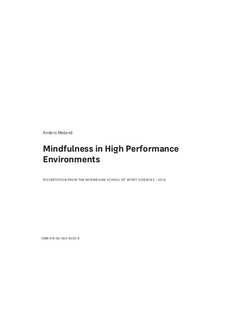| dc.contributor.author | Meland, Anders | |
| dc.date.accessioned | 2016-12-19T12:17:13Z | |
| dc.date.available | 2016-12-19T12:17:13Z | |
| dc.date.issued | 2016 | |
| dc.identifier.isbn | 978-82-502-0533-8 | |
| dc.identifier.uri | http://hdl.handle.net/11250/2425448 | |
| dc.description | Avhandling (doktorgrad) - Norges idrettshøgskole, 2016 | nb_NO |
| dc.description.abstract | Introduction: Being mindful and mindfulness-training have been associated with improved attention control and stress-reduction in the normal population. However, little is known about the effects of such training in high performance cohorts. Aim: The main aim of this thesis was to explore the feasibility and effects of mindfulness-training (MT) in elite cohorts operating in dynamic and taxing environments. We sought to highlight aspects related to feasibility, stress-reduction and the inhibition aspect of executive functions. The studies: This thesis comprises four studies (N = 107). The first study examined the feasibility of MT in a high-performance cohort. The study involved pre to post changes and long-term effects of 12 months of MT in a male high-performance combat aircraft cohort (n = 21), using self-report measures of mindfulness, mental skills and anxiety, followed by post-intervention interviews, and two-year follow-up. In the second study we investigated whether a computerised go/no-go test could be a reliable measure of changes in responseinhibition during whole body vibration in elite orienteering-runners (n = 19). In the third study we sought to determine if a 4-month MT intervention had a measurable impact on stress and inhibitory functioning in military aviation personnel (n = 40) during a period of prolonged high-workloads. This was a controlled study comprising two military helicopter units during their deployment-periods. Personnel in one squadron (n = 25) received MT, while personnel in the other squadron (n = 15) acted as wait-list controls. We used the same go/no-go test as in study 2 to test response inhibition, and also included a test of inhibition of stimulus-driven attentional capture. Stress-reduction was measured using saliva cortisol and self-reported mental demand on the go/no-go test. In the fourth study we investigated the association between different facets of mindfulness and inhibitory control in professional soccer players (n = 42), not yet exposed to MT, using the same computerised tests as in study 3. | nb_NO |
| dc.description.abstract | Paper I: Meland, A., Fonne, V., Wagstaff, A., Pensgaard, A. M. (2015). Mindfulness-based mental training in a high-performance combat aviation population: A one-year intervention study and two-year follow-up. The International Journal of Aviation Psychology 2015, 25 (1), 48-61. | nb_NO |
| dc.description.abstract | Paper II: Ishimatsu, K., Meland, A., Hansen, T. A., Kasin, J. I., Wagstaff, A. S. (2016). Action slips during whole-body vibration. Applied Ergonomics 2016, 55, 241-247. | nb_NO |
| dc.description.abstract | Paper III: Meland, A., Ishimatsu, K., Pensgaard, A. M., Wagstaff, A., Fonne, V., Garde, A. H., Harris, A. (2016). Impact of mindfulness training on physiological measures of stress and objective measures of attention control in a military helicopter unit. The International Journal of Aviation Psychology 2016, 25 (3-4), 191-208. | nb_NO |
| dc.description.abstract | Paper IV: Meland, A., Høgmo, P. M., Ishimatsu, K., Pensgaard, A. M. (submitted). Inhibitory control is differentially associated with mindfulness facets in a high performance cohort. Mindfulness. | nb_NO |
| dc.language.iso | eng | nb_NO |
| dc.subject | mindfulness | nb_NO |
| dc.subject | high-performance | nb_NO |
| dc.subject | stress | nb_NO |
| dc.subject | cortisol | nb_NO |
| dc.subject | executive control | nb_NO |
| dc.subject | inhibition | nb_NO |
| dc.subject | mental skills | nb_NO |
| dc.title | Mindfulness in High Performance Environments | nb_NO |
| dc.type | Doctoral thesis | nb_NO |
| dc.subject.nsi | VDP::Samfunnsvitenskap: 200::Psykologi: 260 | nb_NO |
| dc.subject.nsi | VDP::Teknologi: 500::Informasjons- og kommunikasjonsteknologi: 550 | nb_NO |
| dc.subject.nsi | VDP::Teknologi: 500::Industri- og produktdesign: 640 | nb_NO |
| dc.subject.nsi | VDP::Samfunnsvitenskap: 200::Psykologi: 260::Klinisk psykologi: 262 | nb_NO |
| dc.description.localcode | Seksjon for coaching og psykologi / Department of Coaching and Psychology | nb_NO |
